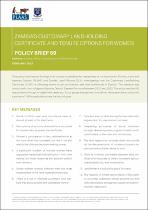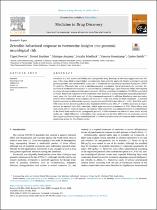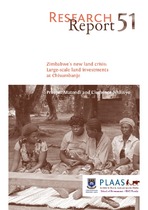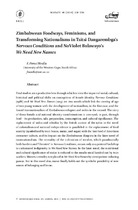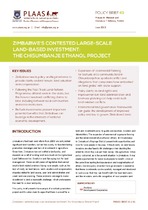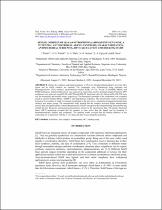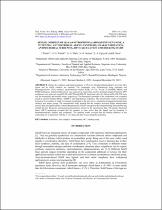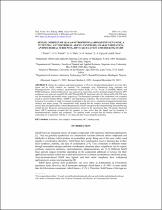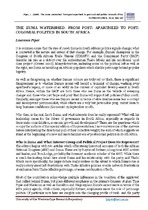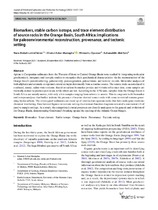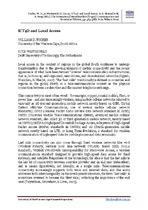Browsing by Title
Now showing items 7869-7879 of 7879
-
Zambia’s Customary Landholding Certificate and Tenure Options for Women
(Institute for Poverty Land and Agrarian Studies (PLAAS), 2023-02) -
Zebrafish behavioral response to ivermectin: Insights into potential neurological risk
(Elsevier, 2022)Ivermectin is a well‐known and widely used anti‐parasitic drug. Recently, in vitro data suggest anti‐viral effi- cacy of the drug, albeit at much higher concentrations than currently approved. Despite warnings by ... -
Zimbabwe's new land crisis: Large-scale land investments at Chisumbanje
(Institute for Poverty, Land and Agrarian Studies, University of the Western Cape, 2015)Zimbabwe’s investments in agriculture, after a contested Fast Track Land Reform Programme (FTLRP) underpinned by often violent land occupations (these were largely contained by the state by 2005), have triggered a ... -
Zimbabwean foodways, feminisms, and transforming nationalisms in Tsitsi Dangarembga’s nervous conditions and no violet bulawayo’s we need new names
(Brill Academic Publishers, 2016)Food studies are a productive lens through which to view the impact of social, cultural, historical and political shifts on conceptions of female identity. Nervous Conditions (1988) and we need new names (2013) are two ... -
Zimbabwe’s contested large-scale land-based investment: The chisumbanje ethanol project
(Institute for Poverty, Land and Agrarian Studies, University of the Western Cape, 2015)Zimbabwe’s fast-track land reform from 2000 onward yielded significant land transfers, but led the country to face debilitating production challenges and lack of investment in agriculture. Since then, Zimbabwe has not ... -
Zinc(ii) complex of (z)-4-((4-nitrophenyl)amino)pent-3-en-2-one, a potential antimicrobial agent: Synthesis, characterization, antimicrobial screening, dft calculation and docking study
(Chemical Society of Ethiopia, 2023)Herein, the synthesis and characterizations of (Z)-4-((4-nitrophenyl)amino)pent-3-en-2-one (HL) ligand and its Zn(II) complex are reported. The compounds were characterized using elemental and thermogravimetric (TGA) ... -
Zinc(ii) complex of (Z)-4-((4-Nitrophenyl)Amino)Pent-3-en-2-one, a potential antimicrobial agent: synthesis, characterization, antimicrobial screening, DFT calculation and docking study
(Chemical Society of Ethiopia, 2023)Herein, the synthesis and characterizations of (Z)-4-((4-nitrophenyl)amino)pent-3-en-2-one (HL) ligand and its Zn(II) complex are reported. The compounds were characterized using elemental and thermogravimetric (TGA) ... -
Zinc(II) complex of (Z)-4-((4-nitrophenyl)amino)pent-3-en-2-one, a potential antimicrobial agent: synthesis, characterization, antimicrobial screening, DFT calculation and docking study
(Bulletin of the Chemical Society of Ethiopia, 2023)Herein, the synthesis and characterizations of (Z)-4-((4-nitrophenyl)amino)pent-3-en-2-one (HL) ligand and its Zn(II) complex are reported. The compounds were characterized using elemental and thermogravimetric (TGA) ... -
The Zuma watershed: from post-apartheid to post-colonial politics in South Africa
(Routledge, 2010)Introduction: It is common cause that the rise of Jacob Zuma in South African politics signals change; what is contested is the nature and extent of that change. For example, Zuma's champions in the Congress of South African ... -
Biomarkers, stable carbon isotope, and trace element distribution of source rocks in the Orange Basin, South Africa: implications for paleoenvironmental reconstruction, provenance, and tectonic setting
(2021)Aptian to Campanian sediments from the Western ofshore to Central Orange Basin were studied by integrating molecular geochemistry, inorganic and isotopic studies to recognize their geochemical characteristics via the ... -
Untitled
(John Wiley & Sons, 2015)Local access in the context of regions in the global South continues to undergo transformation due to the growing ubiquity of mobile connectivity and the recent appearance of what have been termed “inverse” telecommunication ...

